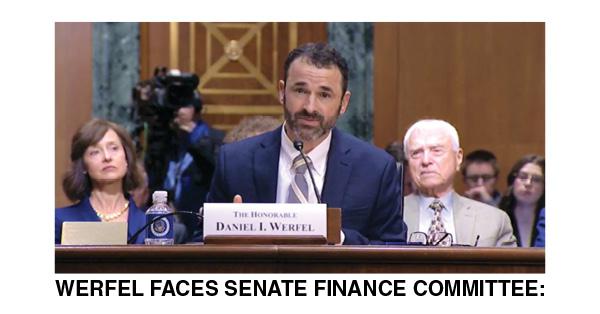WERFEL FACES SENATE FINANCE COMMITTEE:

Daniel Werfel, President Biden’s nominee to take over as commissioner of the Internal Revenue Service, appears poised to clear the first hurdle in taking over the agency – approval from the Senate Finance Committee. In his opening remarks, which you can watch here, Werfel noted that he began his career in public service at the Office of Management and Budget (OMB) as a GS-9 in the late 1990s. GS is an abbreviation for General Schedule, the predominant federal pay scale. The system has 15 grades, beginning with GS-1 and going up to GS-15—there are 10 steps within each grade. A GS-9 is described as "mostly mid-level technical and first level supervisory positions." While at the OMB, Werfel served under nine directors of both political parties. That experience, he says, reinforced the importance of having a "true north" for how to best serve the American people.
During a February 15, 2023, confirmation hearing hosted by the committee, one Republican senator, Thom Tillis of North Carolina, openly signaled his support during the hearing.
"I intend to support your confirmation," Tillis said while praising Werfel’s previous work.
"I think that it’s important to know that somebody with some enterprise transformation experience, particularly in the public work, is desperately needed at the IRS,"Sen. Tillis added.
Werfel served as acting commissioner of the IRS under President Obama from May 22, 2013, to December 23, 2013, taking over the agency after Inspector General report highlighted alleged mismanagement and bias in determining the tax-exempt status for non-profit organizations. He currently is a managing director and partner at Boston Consulting Group, where he runs the firm’s global public sector practice. He also served as controller of the Office of Management and Budget in 2009 for four years under President Obama prior to taking over as acting commissioner.
Spending Inflation Reduction Act Funds
Agency transformation was among the many topics that Werfel faced questions on, though what his intentions are for spending the $80 billion allocated under the Inflation Reduction Act was a primary topic of conversation.
Werfel focused on using the plans to spend the money as an exercise in building trust and maintaining transparency, common themes in many of his responses.
In response to a question about the plans from Committee Ranking Member Mike Crapo (R-Idaho), Werfel said, "let’s be public about the plans. And let’s make sure that we’re building trust and the way forward."
Werfel reiterated a Treasury Secretary Janet Yellen’s directive on how the audits should move forward under the Inflation Reduction Act, a directive that calls for no increase in audit rates for individuals and small businesses that make less than $400,000 per year. Sen. Crapo noted he tried to codify that directive into law through a failed amendment to the IRA, but when other Republicans on the committee suggested that might be a higher-than-expected number of tax cheats making less than $400,000 who are contributing to the tax gap and may need to be the target of enforcement action, Werfel held firm in maintaining his commitment to Secretary Yellen’s directive.
Werfel committed to addressing the root cause of the tax gap, as Democrats focused their questions on the wealthiest individuals and corporations being the problem while Republicans suggested more tax evasion comes from lower earners.
"The IRS has to unpack complex and intricate returns," Werfel said. "I think we have to do a number of things. I’m not sure that training the current workforce will be sufficient. I think we want to hire and bring in experts, maybe some individuals that earlier in their careers prepared these very intricate returns and are ready to come back and potentially serve their country. … And when they’re doing that, I think, Mr. Chairman, they will be able to not only unpack and help collect more revenue from high income taxpayers and large corporations, but also understand how to better measure that so that going forward, the tax gap assessment has a more clear picture of what this gap is."
Other Topics
Werfel fielded questions regarding the failing information technology infrastructure. He committed to considering upgrading systems to take advantage of cloud computing as well as understanding cybersecurity risks and data breeches that have happened at the agency. He also expressed a willingness to examine upgrading the processing of paper returns to use barcode and other scanning technologies.
After the hearing, Chairman Wyden told reporters that expects to hold a vote on Werfel in early March following the coming break for senators to do work in their states.




